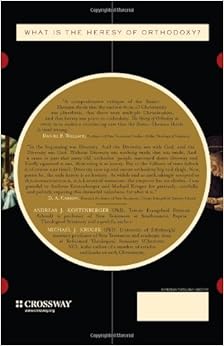

Christians refusal to worship the Roman gods were considered reckless and hostile to the Empire, as it could incite the wrath of the gods. It lacked any meaningful influence or power by worldly standards to aid it in its survival. Next Kruger explorers the persecution which hit the Christian church in the second century, forcing it to learn how to survive in a hostile culture. Kruger points out how these distinctives of Christianity made it able to transcend boundaries of socioeconomic classes and gender, becoming a far more inclusive religion then its Jewish or even Pagan counterparts, especially to the poor and marginalized (but also even to the educated and well-to-do). However, by the early and mid 2nd century, because of many factors and the influx Gentile believers into the church, Christianity became a decidedly distinct religion.This distinction was even being recognized by the pagan culture and Roman government. He starts off by showing how Christianity in the first century still had a largely Jewish flavor to it, with many outsiders not able to perceive the difference between them. Having read his book, I would have to concur. This book is an exploration of the second century, where Kruger makes the argument that this is the most pivotal and important century for Christendom. This is certainly how I felt with Michael Kruger's book Christianity at the Crossroads. You know it's the sign of a great book when you come to the end of it and you're sad that it's ending.


 0 kommentar(er)
0 kommentar(er)
